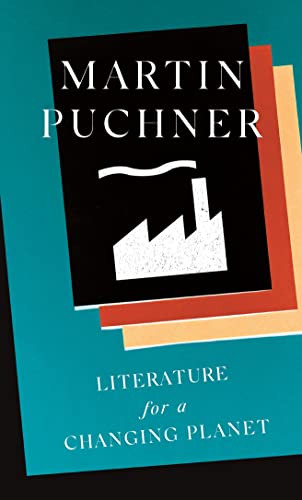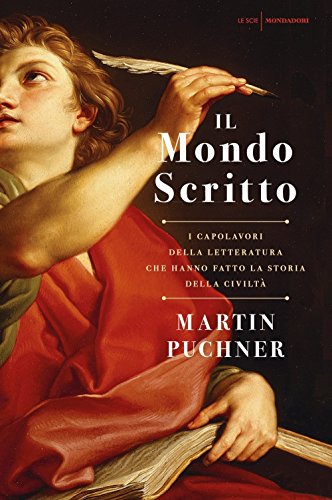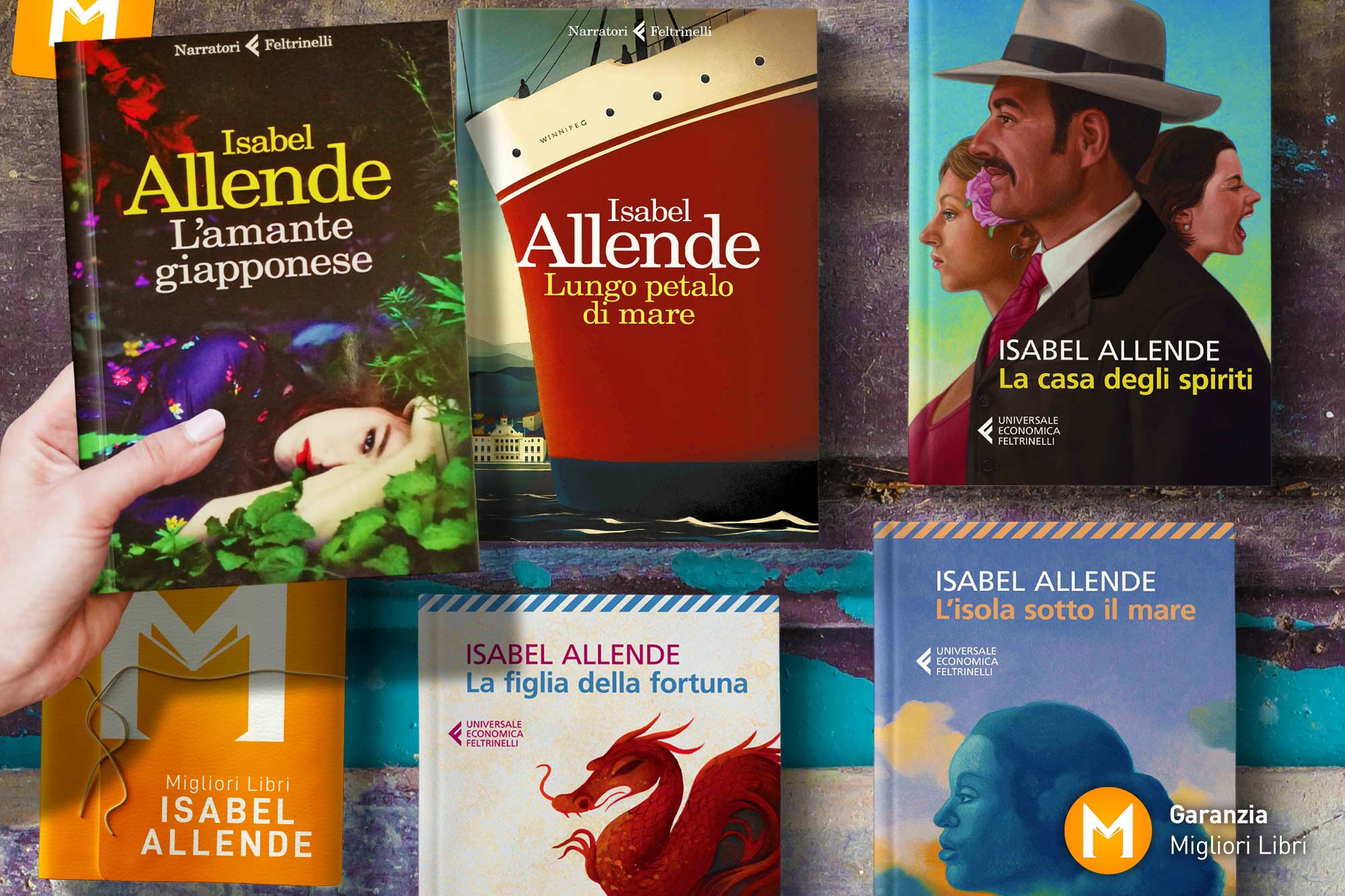Questa è la pagina dedicata a Martin Puchner.
In questa pagina troverai 5 prodotti, tra cui “The Written World: The Power of Stories to Shape People, History, and Civilization (English Edition)”.
Literature for a Changing Planet
Why we must learn to tell new stories about our relationship with the earth if we are to avoid climate catastrophe Reading literature in a time of climate emergency can sometimes feel a bit like fiddling while Rome burns. Yet, at this turning point for the planet, scientists, policymakers, and activists have woken up to the power of stories in the fight against global warming. In Literature for a Changing Planet, Martin Puchner ranges across four thousand years of world literature to draw vital lessons about how we put ourselves on the path of climate change-and how we might change paths before it’s too late. From the Epic of Gilgamesh and the West African Epic of Sunjata to the Communist Manifesto, Puchner reveals world literature in a new light-as an archive of environmental exploitation and a product of a way of life responsible for climate change. Literature depends on millennia of intensive agriculture, urbanization, and resource extraction, from the clay of ancient tablets to the silicon of e-readers. Yet literature also offers powerful ways to change attitudes toward the environment. Puchner uncovers the ecological thinking behind the idea of world literature since the early nineteenth century, proposes a new way of reading in a warming world, shows how literature can help us recognize our shared humanity, and discusses the possible futures of storytelling. If we are to avoid environmental disaster, we must learn to tell the story of humans as a species responsible for global warming. Filled with important insights about the fundamental relationship between storytelling and the environment, Literature for a Changing Planet is a clarion call for readers and writers who care about the fate of life on the planet.
Poetry of the Revolution: Marx, Manifestos, And The Avant-Gardes (Translation/Transnation)
Poetry of the Revolution tells the story of political and artistic upheavals through the manifestos of the nineteenth and twentieth centuries. Ranging from the Communist Manifesto to the manifestos of the 1960s and beyond, it highlights the varied alliances and rivalries between socialism and repeated waves of avant-garde art. Martin Puchner argues that the manifesto–what Marx called the “poetry” of the revolution–was the genre through which modern culture articulated its revolutionary ambitions and desires. When it intruded into the sphere of art, the manifesto created an art in its own image: shrill and aggressive, political and polemical. The result was “manifesto art”–combinations of manifesto and art that fundamentally transformed the artistic landscape of the twentieth century. Central to modern politics and art, the manifesto also measures the geography of modernity. The translations, editions, and adaptations of such texts as the Communist Manifesto and the Futurist Manifesto registered and advanced the spread of revolutionary modernity and of avant-garde movements across Europe and to the Americas. The rapid diffusion of these manifestos was made “possible by networks–such as the successive socialist internationals and international avant-garde movements–that connected Santiago and Zurich, Moscow and New York, London and Mexico City. Poetry of the Revolution thus provides the point of departure for a truly global analysis of modernism and modernity.
Il mondo scritto. I capolavori della letteratura che hanno fatto la storia della civiltà
“Per durare nel tempo, un testo deve rimanere in vita abbastanza a lungo da essere tradotto, trascritto, transcodificato e letto da ogni generazione. Sarà l’educazione, non la tecnologia, a garantire il futuro della letteratura.” La letteratura, frutto del mirabile incontro fra racconto e scrittura, ha plasmato l’immaginario e la condotta di gran parte delle generazioni di esseri umani che si sono avvicendate sulla Terra negli ultimi quattromila anni, e contribuito all’ascesa e alla caduta di imperi e nazioni, alla diffusione di fedi religiose, all’affermarsi di idee filosofiche e politiche, cambiando radicalmente il corso della storia. Alla luce di tale idea guida, Martin Puchner ripercorre le fasi cruciali di una vicenda che prende le mosse dagli antichi testi divenuti codici basilari di intere culture e arriva fino all’odierna saga di Harry Potter. Nel suo straordinario viaggio nel tempo e intorno al mondo l’autore ci presenta, oltre a una fitta schiera di personaggi carismatici e visionari, sedici opere letterarie fondative della civiltà universale, alcune a lungo perdute e poi ritrovate: i poemi omerici Iliade» e Odissea»; la Saga di Gilgameš», di origine sumerica; la Bibbia ebraica di Esdra; gli insegnamenti orali di Buddha, Confucio, Socrate e Gesù, fissati per iscritto dai loro discepoli; il primo grande romanzo di tutti i tempi, la Storia di Genji», creato dal talento letterario di una donna giapponese nota come Murasaki; la Bibbia di Lutero; i samizdat» di Anna Achmatova e Solženicyn contro lo Stato sovietico. In compagnia dell’autore, a Baghdad incontriamo Shahrazàd e l’incanto delle Mille e una notte», mentre nel Nuovo Mondo assistiamo alla stupefacente sopravvivenza del poema epico maya Popol Vuh» nella testimonianza del subcomandante messicano Marcos. Vediamo Miguel de Cervantes, inventore del romanzo moderno, battersi contro pirati reali (quando è fatto prigioniero) e letterari (quando vede pubblicare un falso sequel del Don Chisciotte»). Ammiriamo l’opera pionieristica di Benjamin Franklin in veste di magnate mediatico e il preveggente annuncio di Goethe dell’«epoca della letteratura mondiale» Seguiamo da vicino la nascita e le alterne fortune politiche del Manifesto del Partito comunista» di Marx ed Engels. Visitiamo Troia, Pergamo e la Cina; conversiamo con due premi Nobel, Derek Walcott e Orhan Pamuk, rispettivamente ai Caraibi e a Istanbul; e familiarizziamo con i cantastorie africani della saga orale di Sunjata, capace ancor oggi di catturare l’attenzione di un vasto pubblico. In pagine di piacevolissima lettura, ricche di aneddoti e curiosità, Puchner restituisce al lettore l’immagine vivida del lungo processo con cui la letteratura, e l’evoluzione delle forme tecniche in cui si è storicamente materializzata (alfabeto, carta, libro, stampa, fino agli ultimi ritrovati della tecnologia digitale) hanno letteralmente trasformato il nostro pianeta da mondo «naturale» in mondo «scritto»
Opinioni:
Il racconto di come la letteratura ha forgiato la storia del mondo, in sedici opere: da Alessandro Magno a Ulisse, da Don Chisciotte a Harry Potter. – LaFeltrinelli
Un’anomala storia della letteratura che dalle origini dell’uomo arriva a Harry Potter. Tra i testi ci sono l’Iliade e l’Odissea ma anche epica indiana e africana. La tesi? Siamo quello che leggiamo – Robinson, La Repubblica
Vale la pena leggerlo, per capire perché leggiamo. – Margaret Atwood
The Language of Thieves: My Family’s Obsession with a Secret Code the Nazis Tried to Eliminate (English Edition)
The Written World: The Power of Stories to Shape People, History, and Civilization (English Edition)
The story of literature in sixteen acts—from Homer to Harry Potter, including The Tale of Genji, Don Quixote, The Communist Manifesto, and how they shaped world history In this groundbreaking book, Martin Puchner leads us on a remarkable journey through time and around the globe to reveal the how stories and literature have created the world we have today. Through sixteen foundational texts selected from more than four thousand years of world literature, he shows us how writing has inspired the rise and fall of empires and nations, the spark of philosophical and political ideas, and the birth of religious beliefs. We meet Murasaki, a lady from eleventh-century Japan who wrote the first novel, The Tale of Genji, and follow the adventures of Miguel de Cervantes as he battles pirates, both seafaring and literary. We watch Goethe discover world literature in Sicily, and follow the rise in influence of The Communist Manifesto. Puchner takes us to Troy, Pergamum, and China, speaks with Nobel laureates Derek Walcott in the Caribbean and Orhan Pamuk in Istanbul, and introduces us to the wordsmiths of the oral epic Sunjata in West Africa. This delightful narrative also chronicles the inventions—writing technologies, the printing press, the book itself—that have shaped people, commerce, and history. In a book that Elaine Scarry has praised as “unique and spellbinding,” Puchner shows how literature turned our planet into a written world. Praise for The Written World “It’s with exhilaration . . . that one hails Martin Puchner’s book, which asserts not merely the importance of literature but its all-importance. . . . Storytelling is as human as breathing.”—The New York Times Book Review “Puchner has a keen eye for the ironies of history. . . . His ideal is ‘world literature,’ a phrase he borrows from Goethe. . . . The breathtaking scope and infectious enthusiasm of this book are a tribute to that ideal.”—The Sunday Times (U.K.) “Enthralling . . .
Se volessi saperne di più, dai un’occhiata al nostro canale Youtube!













Lascia un commento
Devi essere connesso per inviare un commento.